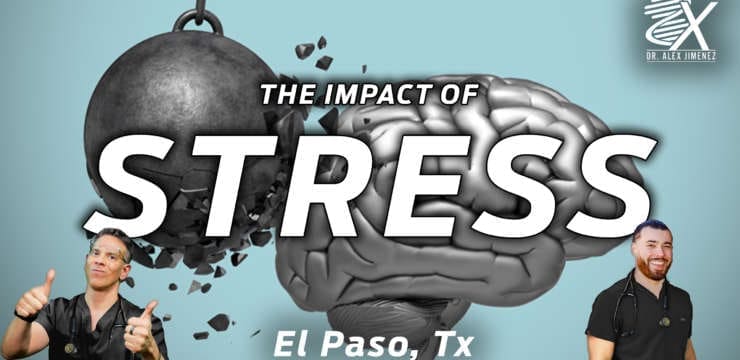Introduction Dr. Alex Jimenez, D.C., presents how chronic stress can impact the body and how it is correlated with inflammation in this 2-part series. Part 1 examined…


Introduction Dr. Alex Jimenez, D.C., presents how chronic stress can impact the body and how it is correlated with inflammation in this 2-part series. Part 1 examined…

Introduction Dr. Alex Jimenez, D.C., presents how stress can impact many individuals and correlate with many conditions in the body in this 2-part series. We…

Introduction In many situations, stress or cortisol in the body allows the host to go into a “fight or flight” response that works together with…

Introduction Everybody deals with stress at some point in their lives. Whether it be a job interview, a huge deadline, a project, or even a test, stress…

Introduction As the world is in constant motion, many people have to endure stressful situations affecting their bodies and health. The body needs hormones like cortisol to keep functioning…

Introduction The brain’s main function in the central nervous system is to send out neuron signals all throughout the body. What this does is that…

Stress can be defined as any external or internal challenge that disrupts homeostasis in an individual. How stressed an individual feels varies depending on their coping skills and mechanisms. For most, stress is anything that causes a flight or flight response. There are several emotions that cause individuals to feel this flight or fight response. A few possibilities are:
Bitterness
Resentment
Retaliation
Anger
Trauma
Betrayal
Rage
DepressionÂ
GossipÂ
Self-hate
Being rejectedÂ
LonelinessÂ
ShameÂ
A stressor produces different mixes of the nervous system and hormonal responses. One stressor may lead to the nervous system activation releasing catecholamines, but small amounts of adrenaline and cortisol. However, another stressor may result in the opposite reaction. In studies performed, it is stated that there are direct relationships between behavior, the brain, and immunity. One association that is well studied is the relationship between autoimmune diseases and self-hatred. By attacking ourselves with our own harsh words and negative thoughts, we see a direct relationship corresponding to an autoimmune response, ultimately ending in autoimmune disease. The study can be viewed below:
Dangers of Excessive CortisolÂ
Cortisol is released in times of stress. It is necessary, but when too much cortisol is released for too long, the body sees side effects. The adrenal glands are consistently producing cortisol. Cortisol stimulates the conversion of noradrenaline to adrenaline. This creates an increased amount of adrenaline in the blood. Cortisol also blocks the conversion of the T4 thyroid hormone. Due to this, individuals under stress may develop systems of hypothyroidism. Additionally, cortisol suppresses the production of T-cell activity. This increases the risk of infection.Â
Another study states that animals genetically susceptible to insulin-dependent diabetes (Type 1 Diabetes) developed the disease more frequently when they were subjected to stress. While under stress, the elevated cortisol levels in the bloodstream block insulin, making it difficult to control blood glucose. Â
Phase AngleÂ
Stress plays an essential factor in phase angle as it disrupts homeostasis. The phase angle is a snapshot at cellular health that provides practitioners with the integrity of your cellular membranes. The healthier an individual is, the higher their phase angle, making it harder for inflammation and infection to infiltrate. The more stress an individual is under, the higher their cortisol is. This increases their blood glucose level and can result in a higher body fat percentage. These combined decrease cellular health and cause a permeable cellular membrane. We evaluate and monitor our patient’s phase angle by using an InBody 770 machine. The anthropometric measurements show us where inflammation is and other significant numbers such as visceral fat, basal metabolic rate, and segmental water analysis.Â
[embedyt] www.youtube.com/watch?v=WwbIsPNUYqs%5B/embedyt%5D
Diagnostic TestingÂ
Although we utilize many different diagnostic lab companies, we use the Adrenal Hormone Report from Doctors Data to measure cortisol levels. A sample report is shown below:Â
Â
Â
CORTISOL IS NECESSARY, AND STRESS IS A NATURAL RESPONSE TO PROTECT THE BODY. HOWEVER, WHEN WE SEE THE “STRESS RESPONSE” ON FOR TOO LONG, WE KNOW OTHER ISSUES ARE GOING ON. IT IS CRUCIAL TO REMEMBER TO RELAX, TAKE TIME TO FOCUS ON DEEP BREATHING, MEDITATION OR YOGA, AND UNWIND. -KENNA VAUGHN, ACSM-CEP, SENIOR HEALTH COACHÂ
References:Â
Maier SF, Watkins LR, Fleshner M. Psychoneuroimmunology. The interface between behavior, brain, and immunity. Am Psychol. 1994 Dec;49(12):1004-17. doi: 10.1037//0003-066x.49.12.1004. PMID: 7818221.Â
Dr Ron Grisanti,D.C “Insiders Guide.†Functional Medicine University (FMU).
Additional Online Links & Resources (Available 24/7)


Â
Online Appointments or Consultations:  https://bit.ly/Book-Online-Appointment


Â
Online Physical Injury / Accident Intake Form: bit.ly/Fill-Out-Your-Online-History


Â
Online Functional Medicine Assessment: bit.ly/functionmed
Â
Â
Â
Disclaimer
Â
The information herein is not intended to replace a one-on-one relationship with a qualified health care professional, licensed physician, and is not medical advice. We encourage you to make your own health care decisions based on your research and partnership with a qualified health care professional. Our information scope is limited to chiropractic, musculoskeletal, physical medicines, wellness, sensitive health issues, functional medicine articles, topics, and discussions. We provide and present clinical collaboration with specialists from a wide array of disciplines. Each specialist is governed by their professional scope of practice and their jurisdiction of licensure. We use functional health & wellness protocols to treat and support care for the musculoskeletal system’s injuries or disorders. Our videos, posts, topics, subjects, and insights cover clinical matters, issues, and topics that relate and support, directly or indirectly, our clinical scope of practice.* Our office has made a reasonable attempt to provide supportive citations and has identified the relevant research study or studies supporting our posts. We provide copies of supporting research studies available to regulatory boards and the public upon request. We understand that we cover matters that require an additional explanation of how it may assist in a particular care plan or treatment protocol; therefore, to further discuss the subject matter above, please feel free to ask Dr. Alex Jimenez or contact us at 915-850-0900.  Read More…
Dr. Alex Jimenez DC, MSACP, CCST, IFMCP*, CIFM*, CTG*
email: coach@elpasofunctionalmedicine.com
phone: 915-850-0900
Licensed in Texas & New Mexico

The endocrine system is very delicate and precise in the human body. The endocrine system is responsible for helping to control mood, growth, development, metabolism, how our organs work, and reproduction. The critical factor of the endocrine system is regulating how much of each hormone is released. This depends on how much of the hormone is already in the bloodstream and other substances like calcium.Â
Cortisol
One of the main hormones the endocrine system is responsible for is cortisol. Cortisol is the primary stress hormone and also increases blood sugars, enhances the brain’s use of glucose, and increases the substances that repair tissue. Additionally, cortisol is the primary hormone in control of our flight-or-fight response. However, the circadian rhythm of cortisol should always be considered. Cortisol is one of the hormones that is released in cardigan rhythm. Cortisol is usually highest first thing in the morning, drops, and will plateau for most of the day until evening time before bed, where it will drop again. Performing lab work to assess cortisol levels is beneficial as cortisol is responsible for many daily functions. Cortisol is produced by the Zona fasciculata of the adrenal cortex and is regulated by several factors. It is influenced by sleep patterns, light/dark exposure, and mealtimes. Cortisol also helps with widespread tissue damage like inflammation, illness, or an infection as well as plays a role in mental and emotional stress. To test our patient’s cortisol levels and patterns, we use a test from DUTCH. This test is called DUTCH Plus, and a sample report is shown below. This test allows us to track a patient’s rhythm for 24 hours as well as other hormones.Â
Â
StressÂ
As previously stated, cortisol is the main hormone for controlling stress. While stress is necessary for the human body to function, chronic stress puts your health at risk. The body’s stress response system is normally self-limiting, and once the threat is gone, the stress levels reduce, and the body syncs back into a level of homeostasis. However, when chronic stress is around, cortisol remains on and pumps into the system at a high rate. This long-term activation of stress overexposes the body to cortisol and other stress hormones that lead to problems such as:Â
AnxietyÂ
Depression
Digestive problems
Headaches
Heart disease
Sleep problems
Weight gain
Memory and concentration impairmentÂ
Phase Angle
The phase angle is how health care professionals can monitor the integrity of cellular membranes. If the phase angle begins to decline, it has been linked directly to a decline in overall health. Similar to if phase angle increases, overall health is increasing. The integrity of cellular membranes is essential as cell survival depends on solid membranes. When the cellular wall is weak, it can collapse. From here, it is difficult for the body to take up the proper nutrients it needs. Additionally, with a weak cellular membrane, the cell is left with little to no protection from outside invaders. Stress impacts phase angle by causing individuals to gain weight and decreasing overall health.
We monitor a patient’s phase angle with the use of the InBody 770. This advanced machine allows us to not only track the phase angle of our patients but many other areas of their health as well, including but not limited to intracellular and extracellular water.Â
[embedyt] www.youtube.com/watch?v=WwbIsPNUYqs%5B/embedyt%5D
STRESS CAN BE MORE DEBILITATING THAN INDIVIDUALS REALIZE. A GREAT WAY TO COMBAT STRESS AND HELP PROTECT YOUR PHASE ANGLE IS TO PRACTICE GOOD SLEEP HYGIENE, EAT PROPER NUTRIENTS, REGULAR EXERCISE, AND MEDITATION. -KENNA VAUGHN, ACSM-EP SENIOR HEALTH COACH
References:Â
Keller A, Litzelman K, Wisk LE, Maddox T, Cheng ER, Creswell PD, Witt WP. Does the perception that stress affects health matter? The association with health and mortality. Health Psychol. 2012 Sep;31(5):677-84. doi: 10.1037/a0026743. Epub 2011 Dec 26. PMID: 22201278; PMCID: PMC3374921.Â
Mayo Clinic Staff. “Stress Management Resources.†Mayo Clinic, Mayo Foundation for Medical Education and Research, 26 Feb. 2021, www.mayoclinic.org/healthy-lifestyle/stress-management/resources/hlv-20049495.  Â
Additional Online Links & Resources (Available 24/7)


Â
Online Appointments or Consultations:  https://bit.ly/Book-Online-Appointment


Â
Online Physical Injury / Accident Intake Form: bit.ly/Fill-Out-Your-Online-History


Â
Online Functional Medicine Assessment: bit.ly/functionmed
Â
Â
Â
Disclaimer
Â
The information herein is not intended to replace a one-on-one relationship with a qualified health care professional, licensed physician, and is not medical advice. We encourage you to make your own health care decisions based on your research and partnership with a qualified health care professional. Our information scope is limited to chiropractic, musculoskeletal, physical medicines, wellness, sensitive health issues, functional medicine articles, topics, and discussions. We provide and present clinical collaboration with specialists from a wide array of disciplines. Each specialist is governed by their professional scope of practice and their jurisdiction of licensure. We use functional health & wellness protocols to treat and support care for the musculoskeletal system’s injuries or disorders. Our videos, posts, topics, subjects, and insights cover clinical matters, issues, and topics that relate and support, directly or indirectly, our clinical scope of practice.* Our office has made a reasonable attempt to provide supportive citations and has identified the relevant research study or studies supporting our posts. We provide copies of supporting research studies available to regulatory boards and the public upon request. We understand that we cover matters that require an additional explanation of how it may assist in a particular care plan or treatment protocol; therefore, to further discuss the subject matter above, please feel free to ask Dr. Alex Jimenez or contact us at 915-850-0900.  Read More…
Dr. Alex Jimenez DC, MSACP, CCST, IFMCP*, CIFM*, CTG*
email: coach@elpasofunctionalmedicine.com
phone: 915-850-0900
Licensed in Texas & New Mexico

Autoimmune diseases are a much larger problem than they were 10 years ago. Now, autoimmune diseases are reaching an epidemically high level with over 50 million people diagnosed. All autoimmune diseases are linked to one common condition, inflammation. An autoimmune disease is when the immune system is under constant inflammation from frequently recurring triggers. Those diagnosed with an autoimmune disease have one or more of these stressors overly present in their life:
-Chronic Emotional and Cognitive Stress
-Unhealthy Coping PatternsÂ
-Poor NutritionÂ
-Gastrointestinal Stress
-Adrenal Stress
-Hormonal StressÂ
-Inflammatory and Infectious Stress
-Toxic Stress